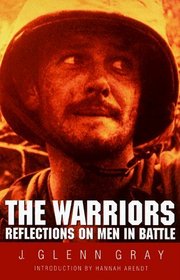Yesterday I finished The Warriors: Reflections on Men in Battle by J. Glenn Gray, which had been given to me with a recommendation from one of the attendees of the NWTRCC conference earlier this month.
Gray received the notice that his doctorate in philosophy had been awarded in the same batch of mail that contained his draft notice. He served in Africa and Europe in counter-intelligence: working to root out and interrogate spies and saboteurs and prisoners and the like as the Allies moved in on Axis-controlled territory.
He wrote his book years afterwards, using letters he wrote at the time and a journal he kept during the war to refresh his memory of what it was like to be a soldier in war time. His book tries to explore what war means to people, what its attractions are, how different people cope with its stresses in different ways, how the impulse to make war relates to other human drives, and his vision for how a great nation might become greater by renouncing war entirely.
In a way, it picks up where William James’s more superficial The Moral Equivalent of War leaves off.
A book like this almost can’t help but be thought-provoking, and it was, but I still thought it was a little too abstract and ethereal for my tastes. His most interesting observations come from the battlefield, but his conclusions seem to float way above it.
Here are some excerpts that I thought were noteworthy. First, from his forward to the edition:
To the usual judgment [the My Lai massacre] seems far more of an atrocity than the actions of the pilots who bomb such hamlets from the sky or of the artillery men who lob in shells from a great distance. The reason given is that the infantrymen are brutalized by their deeds. Yet brutalization is hardly the worst that can happen to a man, for it can be healed in time and in circumstances of peaceful living. But the man who kills from a distance and without consciousness of the consequences of his deeds feels no need to answer to anyone or to himself. His is an unconscious depravity that can increase imperceptibly in civilian life. Dissociated from his deeds he can become far more monstrous than the infantry soldier or lower-echelon officer who occasionally goes beserk under battle strain. The “terrifyingly normal” men, who are ever in the vast majority, are those who make our age a monstrous one.
From a section on “political guilt”:
[W]hen the news of the atomic bombing of Hiroshima and Nagasaki came, many an American soldier felt shocked and ashamed. The combat soldier knew better than did Americans at home what those bombs meant in suffering and injustice. The man of conscience wherever he was realized intuitively that the vast majority of the Japanese in both cities were no more, if no less, guilty of the war than were his own parents, sisters, or brothers. In his shame, he may have said to himself, as some of us did: “The next atomic bomb, dropped in anger, will probably fall on my own country and we will have deserved it.” Such a conviction will hardly relieve him of the heavy sense of wrong that his nation committed and the responsibility for which he must now in some measure share. All the arguments used in justification — the shortening of the war by many months and the thousands of American lives presumably saved — cannot alter the fact that his government was the first to use on undefended cities, without any warning, a monstrous new weapon of annihilation.
Worst of all about such deeds is that millions accepted and felt relief. Hearing this near-exultation in the enemy’s annihilation, one can only conclude that political guilt has another source than the freedom of the individual to affect group action. It lies in the degree of his identification with the goals and the means of realizing them that his nation adopts. The person who inwardly approves an immoral action of his government or military unit testifies to his own probable decision had he possessed the freedom and opportunity of the actors. Freedom is possible, therefore, not only in the power to do or prevent, but also in inner assent and consent to action by others. With a relative criterion like this it is, of course, impossible to be exact in estimating even one’s own guilt. Yet the jubilation in evil deeds allows little room for doubt that inner consent is often forthcoming. So do thousands of people increase their political guilt in wartime beyond the range of their direct action.


